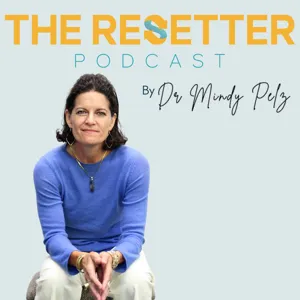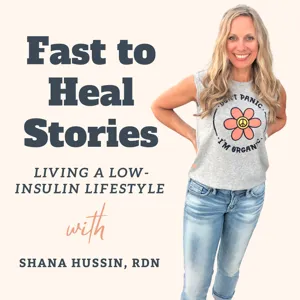Podcast Summary
Exploring the Link Between Circadian Rhythm and Nutrition: Manipulating meal times can help minimize jet lag and improve overall health. Eating immediately upon waking is not ideal, and recent research suggests intermittent fasting may benefit cardiovascular health. Maintaining mineral levels during fasting is crucial to avoid energy crashes.
Key takeaway from this episode of the Resetter podcast is that circadian rhythm expert Sachin Panda discusses the importance of timing of food and how it relates to our health. He explains that eating immediately upon waking is not ideal and that manipulating meal times can help minimize jet lag. Panda also shares his thoughts on recent research regarding intermittent fasting and cardiovascular health, as well as the role of weight loss drugs in circadian rhythm. Additionally, the podcast host discusses the importance of maintaining mineral levels during fasting to avoid energy crashes. Overall, this in-depth conversation provides valuable insights into the complex relationship between circadian rhythm and nutrition.
The impact of what and when we eat on our health: Timing of food intake can significantly affect its health benefits or harms, even for good or junk food. Compressing eating window can help our bodies rest and heal.
Both what and when we eat play crucial roles in our health, particularly when it comes to managing chronic diseases, inflammation, and weight loss. While good quality food is essential, timing can significantly impact its effects. Eating good food at the wrong time can make it less beneficial or even harmful. On the other hand, even junk food can be less detrimental if consumed at the right time, as it can trigger defense mechanisms in our bodies. However, this doesn't give us a free pass for junk food. Instead, compressing our eating window can help our bodies rest and heal from the toxicity of food. Most of the research on these topics comes from laboratory studies using mice, but since we share almost 99% of our genes with them, the findings can be applied to humans. Remember, timing can make good food junk, but it can also lessen the bad effects of junk food.
Understanding metabolic health through mouse studies and human trials: Mouse studies can provide insights, but human trials are necessary for applying findings to our lives. Individual health conditions and severity of metabolic diseases impact the effectiveness of interventions like fasting and time-restricted eating.
While mouse studies can provide some insights into the effects of various interventions on metabolic health, human studies are essential for making these findings applicable to our own lives. Comparing metabolic systems of individuals with vastly different ages and health conditions is not productive. The impact of certain interventions on internal organs that are difficult or impossible to sample in humans, such as the brain, can be studied in mice. However, these studies should be seen as getting us in the ballpark, and we need to decide which seat to sit in based on our individual health conditions and severity of metabolic diseases, which include blood glucose, blood cholesterol, blood pressure, and abdominal obesity. The length and type of fasting or time-restricted eating that is best for metabolic health varies depending on individual health conditions and lifestyle habits. Therefore, it's crucial to determine if timing of food intake is contributing to metabolic diseases or if other factors are at play before making any drastic changes.
Narrowing eating window for health benefits: Find a consistent eating window that fits your lifestyle and stick to it for potential health benefits, but be mindful of drastically reducing it too much.
The timing and duration of our eating window can impact our health, particularly for those with longer eating windows. For example, if someone's body is used to a 14-hour eating window, but they can narrow it down to a 12-hour window, they may experience health benefits. However, it's important to note that drastically reducing the eating window too much, such as to 6 or 8 hours, may not be sustainable for everyone, especially for those who also try to restrict nutrient intake or engage in intense physical activity. The key is to find a window that works for you and stick to it consistently. Additionally, paying attention to the quality and nutrient density of the food within your eating window is also important for overall health.
Improved sleep, energy, and digestion with intermittent fasting: Intermittent fasting can lead to better sleep, increased energy, and reduced acid reflux or heartburn. Long-term benefits are not fully understood, and individual needs and hormonal profiles should be considered.
Intermittent fasting or time-restricted eating can bring various benefits such as improved sleep quality, increased energy levels, and reduced acid reflux or heartburn. These benefits are driven by the fact that people tend to sleep better when they finish their last meal several hours before bedtime. However, it's important to note that there is limited long-term research on the effects of intermittent fasting beyond a year. Some people who were previously prediabetic have reported continued benefits for several years, but it's unclear if they will eventually develop health issues related to aging or genetics. Overall, it's crucial to pay attention to individual needs and hormonal profiles, especially for women, to ensure a healthy and sustainable approach to intermittent fasting.
Optimizing health from 35 to 60 for life changes: Focus on food, exercise, and sleep timing, quality, and quantity for metabolic health and better manage energy levels, productivity, and quality of life during midlife.
Maintaining optimum physical, emotional, and intellectual health from the ages of 35 to 60 is crucial due to various life changes and responsibilities. This period is when people may start families, care for aging parents, and experience job changes, among other things. By focusing on the timing, quality, and quantity of food, exercise, and sleep, we can improve our overall health and align it with our body's natural circadian rhythm. This will help us better manage our energy levels, improve our productivity, and enjoy a better quality of life during the later years. By striving for metabolic health without chronic medication before significant life milestones, such as children finishing high school or college, we can ensure we're in the best position to fully engage and celebrate these moments. Timing is a personal and tangible aspect of our lives, and aligning it with our body's natural rhythm can lead to significant improvements in our overall well-being.
Waiting to eat after waking up for metabolic health: Consider waiting an hour or two after waking up to eat for potential metabolic benefits, but personal circumstances and hormonal rhythms should be considered.
The ideal eating window to maximize metabolic health depends on personal circumstances and the body's natural hormonal rhythms. When we wake up, cortisol levels are high, and melatonin, the night hormone, is still present. Melatonin slows down insulin production, making it less effective for processing breakfast foods. Therefore, waiting an hour or two after waking up to eat can help optimize metabolism. However, this theory hasn't been proven through human studies due to the difficulty of conducting such experiments. Ultimately, the best eating schedule is a personal decision that balances convenience, health goals, and individual hormonal rhythms.
Eating patterns, hormones, and gut microbes: Delaying breakfast and maintaining a diverse microbiome can improve health by aligning with natural hormonal rhythms and supporting food breakdown
There seems to be a connection between our eating patterns, hormones, and the microbes in our gut. Delaying breakfast by a few hours in the morning, without advancing dinner time significantly, can improve blood glucose levels and align with our natural hormonal rhythms. Additionally, the composition of our gut microbiome changes throughout the day due to the feeding and fasting cycle, and having a diverse range of microbes is beneficial for breaking down food and maintaining overall health. The PowerSync 60 fitness program, created in collaboration with Tony Horton, offers a customized approach to eating and working out that considers these factors. While more research is needed, the evidence suggests that aligning our eating patterns with our natural hormonal rhythms and maintaining a diverse microbiome can support better health.
How Food Timing and Quality Affect Our Internal Clock: Adjusting meal times to sync with light-dark cycles can help minimize jet lag and improve overall adjustment to new time zones.
Our internal clock, or circadian rhythm, is influenced by both light and food. While light primarily affects our sleep-wake cycle, food timing and quality influence our metabolic rhythm. The microbiome, which plays a role in regulating these processes, also responds to the quality and timing of food. The study of how these factors interact, particularly when traveling to new time zones or working shifts, is an active area of research. The preliminary findings suggest that adjusting food timing in sync with light-dark cycles can help the body reset faster to new time zones. It's important to note that everyone's response may vary, and some people may take longer than others to adjust. The takeaway for travelers is to consider adjusting meal times along with changes in light exposure to help minimize jet lag and improve overall adjustment to new time zones.
Adjust meal times during travel for jet lag relief: Eating according to the new time zone on travel day and avoiding excessive airline food can help mitigate jet lag effects
Adjusting meal times to the new time zone during travel can help mitigate the effects of jet lag. Eating late at night in a new place or consuming excessive airline food and watching movies on long flights can disrupt your circadian rhythm. If possible, try to eat according to the new time zone on the day of travel. Additionally, going for a morning walk or jog after arriving at your destination can help reset your body to the new time zone. Successful travelers often advise against eating on the flight and suggest taking your own food instead. For larger time zone shifts, it may be necessary to adjust meal times and sleep patterns a few days before travel, but if that's not feasible, focusing on meal timing on the day of travel can still make a significant difference.
Study on intermittent fasting's impact on cardiovascular health not accurate due to unreliable data: A recent study claiming increased cardiovascular events with intermittent fasting is not accurate due to underreported food intake and lack of distinction between different fasting methods.
A recent headline claiming a 91% increase in cardiovascular events for those practicing intermittent fasting is not based on accurate nutrition data. The data used in this study comes from a survey where over 60% of participants underreported their food intake, making it an unreliable source for policy or health recommendations. The study did not differentiate between those fasting for less than 8 hours and those eating only one meal, leading to potential misinterpretation of the results. It's crucial to remember that intermittent fasting, while not without potential risks, has been linked to numerous metabolic benefits, and more reliable research should be considered when evaluating its impact on cardiovascular health.
Study on eating one meal a day sparks confusion and fear: One abstract suggesting eating one meal a day increases risk of death is based on limited data, not peer-reviewed, and does not account for individual health needs or circumstances.
A recent abstract released by the American Heart Association caused confusion and fear among the public, as it suggested that eating only one meal a day could increase the risk of death. However, the abstract was not intended for public consumption and was based on limited data from a small study. The study did not provide information on what or how much the participants ate, only that they ate within less than 8 hours. The connection between eating patterns and mortality was indirect, and the study did not account for other factors like smoking or lack of sleep. The abstract was also not peer-reviewed, leading to widespread panic and concern. It's important to remember that this abstract does not definitively prove that eating one meal a day increases the risk of death, and more research is needed to make a definitive conclusion. Additionally, individual health needs and circumstances vary greatly, so it's important to consult with healthcare professionals for personalized advice.
Understanding individual sleep needs and considering weight loss drugs: Some people need longer sleep durations, while weight loss drugs can help those struggling with cravings and have failed to lose weight through lifestyle changes, but they come with potential side effects and long-term studies are needed to understand their full impact.
While some individuals may require longer sleep durations due to their body's demands, it's essential not to discourage them from getting the rest they need. Regarding new weight loss drugs, they can be beneficial for those who struggle with cravings and have failed to lose weight through lifestyle changes, particularly those with a BMI of 35 or higher and comorbidities. However, these drugs come with potential side effects, including loss of appetite and nutrient deficiencies. Long-term studies are needed to understand the full impact of these drugs on the body, particularly concerning gastrointestinal health. A potential solution could be combining the lowest possible drug doses with intermittent fasting or time-restricted eating to minimize side effects while maintaining the drug's benefits. This approach would require further research to determine its effectiveness.
Measuring health through circadian rhythm: Optimizing circadian rhythm improves overall health, measured by regular bowel movements, energy after waking, hunger in the morning, and sleepiness in the evening. Achieve this through consistent sleep schedule, outdoor light exposure, and physical activity in the late afternoon.
Health goes beyond just what we eat and involves optimizing our circadian rhythm. According to the speaker, having a good circadian rhythm is the best biomarker of good health. This can be measured through regular bowel movements, feeling energetic after waking up, having healthy hunger in the morning, and feeling sleepy in the evening. The speaker also emphasized the importance of movement throughout the day and avoiding muscle pain and joint aches in the late afternoon. To achieve this, they recommend having a consistent sleep schedule, getting outdoor light exposure, and engaging in physical activity in the late afternoon. The speaker's work includes two books, "The Circadian Code" and "The Circadian Diabetes Score," and an app called On Time Health, which helps individuals optimize their circadian rhythm. By focusing on circadian optimization, individuals can improve their overall health and feel a greater sense of agency and control over their lives.
Effective time management for a healthy lifestyle: Recognize the significance of timing in various aspects of health routines to make the most of efforts and maximize benefits of healthy habits
Managing your time effectively is a crucial aspect of maintaining a healthy lifestyle. As discussed in the podcast, simply going to the gym and keeping track of time can lead to improvements in cardiovascular health and strength. However, it's essential to recognize that time management extends beyond exercise. The podcast highlighted how often we overlook the importance of timing in various aspects of our health routines. By acknowledging the significance of time, we can make the most of our efforts and ensure we're maximizing the benefits of our healthy habits. So, whether it's scheduling workouts, planning meals, or prioritizing sleep, remember that the timing of these activities is just as important as the activities themselves.





